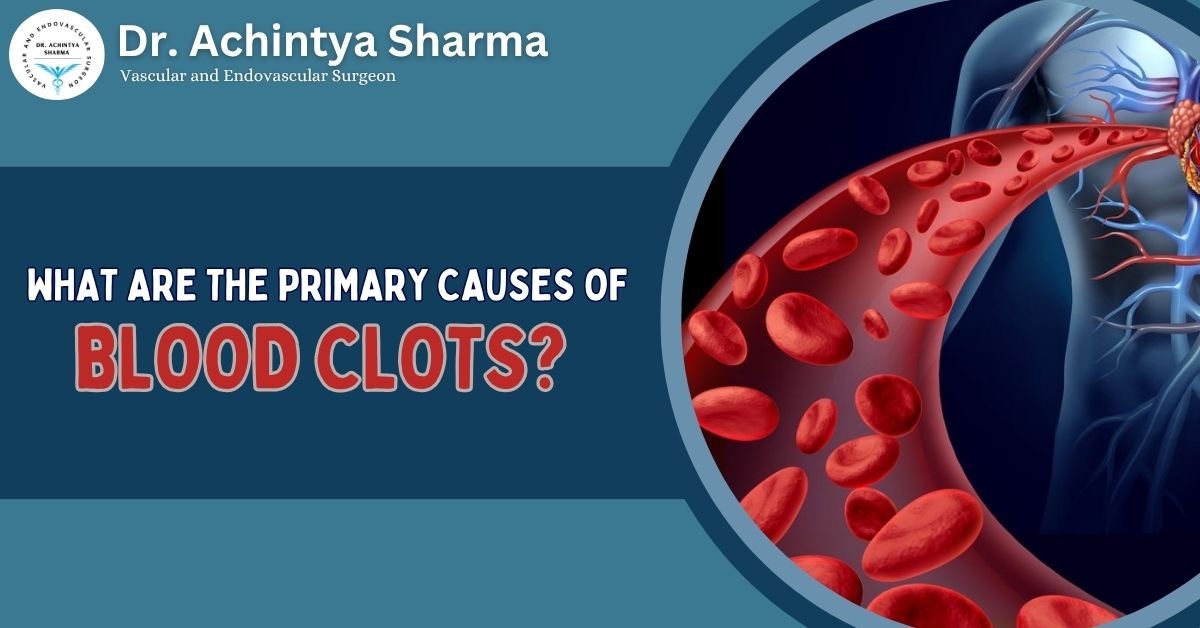Blood clots help your body stop bleeding and start healing after an injury. They help stop bleeding when you’re injured. But clots can sometimes form without a good reason, and that can be harmful. Understanding the cause of blood clots can help you stay safe and act early. This blog will look at what mainly causes blood clots and how to spot the risks early. You’ll also get expert insights from Dr. Achintya Sharma, a leading voice in cardiovascular care. Whether you’re looking to prevent clots or simply curious, this guide gives you the answers you need in a clear, friendly way.
Why You Should Care About Blood Clots
Blood clots can affect anyone, young or old. They often go unnoticed until they cause serious problems like deep vein thrombosis (DVT), stroke, or heart attack. Knowing the cause of blood clots helps you take steps to avoid them. It also gives you the power to spot early signs and prevent life-threatening conditions.
According to Dr. Achintya Sharma, one of the biggest dangers is that many people don’t realize they’re at risk. That’s why understanding the causes is so important. Awareness leads to prevention—and possibly, even saves lives.
What Are the Main Causes of Blood Clots?
Now let’s dive into the most common causes of blood clots. These are the ones everyone should know about:
1. Long Periods of Inactivity
Sitting or lying down for a long time—like during travel, illness, or recovery—can slow your blood flow. This sluggish flow can lead to clots, especially in your legs.
2. Injury to Blood Vessels
When a vein or artery is damaged, your body forms clots to seal the injury. Sometimes, the clot grows too large or forms where it shouldn’t, causing blockages.
3. Surgery or Hospitalization
Surgical procedures, especially those involving the lower body, are a major cause of blood clots. Hospital stays often involve reduced movement, which increases risk.

4. Medical Conditions
Certain diseases increase clotting risk. These include:
- Cancer
- Heart disease
- Autoimmune disorders
- Clotting disorders (genetic or acquired)
5. Hormonal Changes
Taking birth control pills or hormone replacement therapy increases estrogen levels, which thickens the blood and raises clot risk. Pregnancy also increases clotting factors.
6. Smoking
Smoking harms your blood vessels and increases inflammation. It raises the risk of clots forming and makes it harder for blood to move through your veins properly.
7. Obesity
Carrying extra weight can strain your veins—especially in your legs—which slows down blood flow and raises the chance of clots forming.
Dr. Achintya Sharma recommends paying special attention to these factors, especially if you have more than one. “Even healthy people can develop clots if the conditions are right,” he says.
How to Prevent Blood Clots
The good news? Many risk factors are within your control. Here’s what you can do:
- Move frequently: Stand up and stretch every hour if you sit for long.
- Stay hydrated: Dehydration thickens the blood.
- Wear compression socks: Especially during travel or recovery.
- Quit smoking: It’s an important way to help reduce your risk of blood clots.
- Maintain a healthy weight: It supports good circulation.
- Know your risk: Talk to your doctor if you have a family history or chronic illness.
“Prevention is easier and safer than treatment. Small daily habits go a long way.”
When to Get Help
Watch out for common warning signs that may signal a blood clot, such as:
- Swelling in one leg
- Redness or warmth in the leg
- Sudden chest pain
- Difficulty breathing
- Sharp pain when walking
If you notice any of these, don’t wait. Seek medical attention immediately.
FAQs: Your Most Asked Questions-
Q1. What is the most common cause of blood clots?
Inactivity, especially during travel or recovery, is one of the top causes. It slows circulation, allowing clots to form more easily.
Q2. Can stress cause blood clots?
While stress alone isn’t a direct cause, it can contribute indirectly through higher blood pressure or unhealthy habits.
Q3. Is dehydration a cause of blood clots?
Yes, thickened blood from dehydration can make clot formation more likely.
Q4. How do I know if I’m at risk?
Check for risk factors like smoking, obesity, certain medications, or a family history. Speak with a specialist like Dr. Achintya Sharma for a personalized assessment.
Q5. Can young people get blood clots?
Absolutely. While older adults are at higher risk, clots can form at any age under the right conditions.
Conclusion
Blood clots can be serious, but they’re often preventable. By knowing the main cause of blood clots, you empower yourself to make better health choices. Whether it’s moving more, quitting smoking, or staying hydrated, small habits can make a big difference. Keep an eye on your risk factors and never ignore warning signs. And if you’re unsure, talk to a trusted expert like Dr. Achintya Sharma. He’s helped many people identify their risk and take the right steps to stay safe. Remember, when it comes to blood clots, knowledge isn’t just power, it’s protection. Stay informed, stay active, and stay safe.




